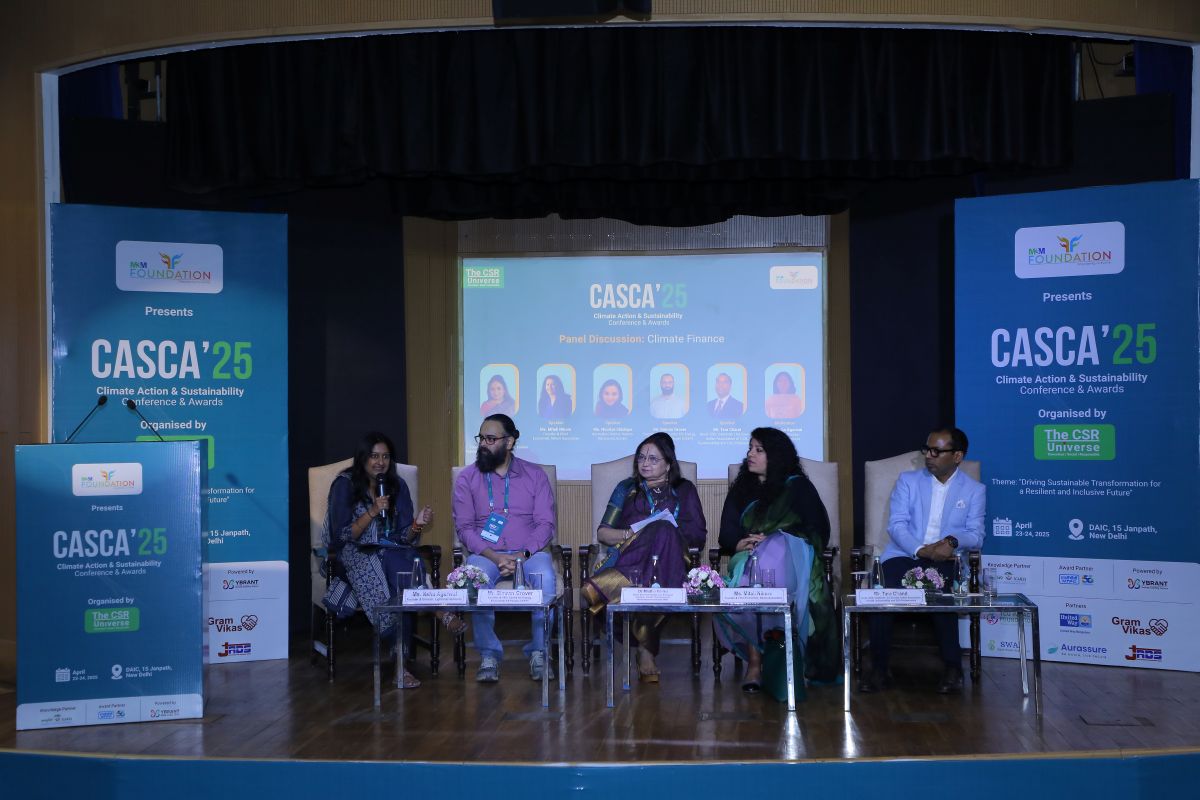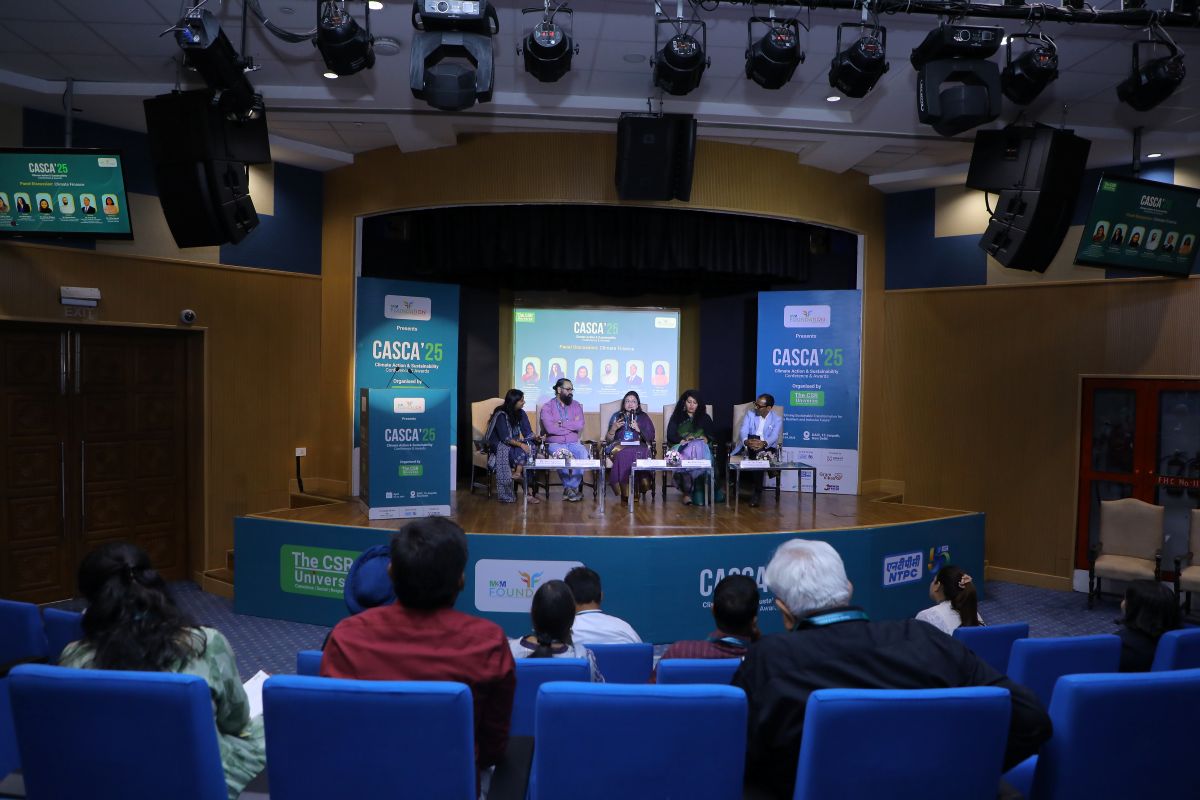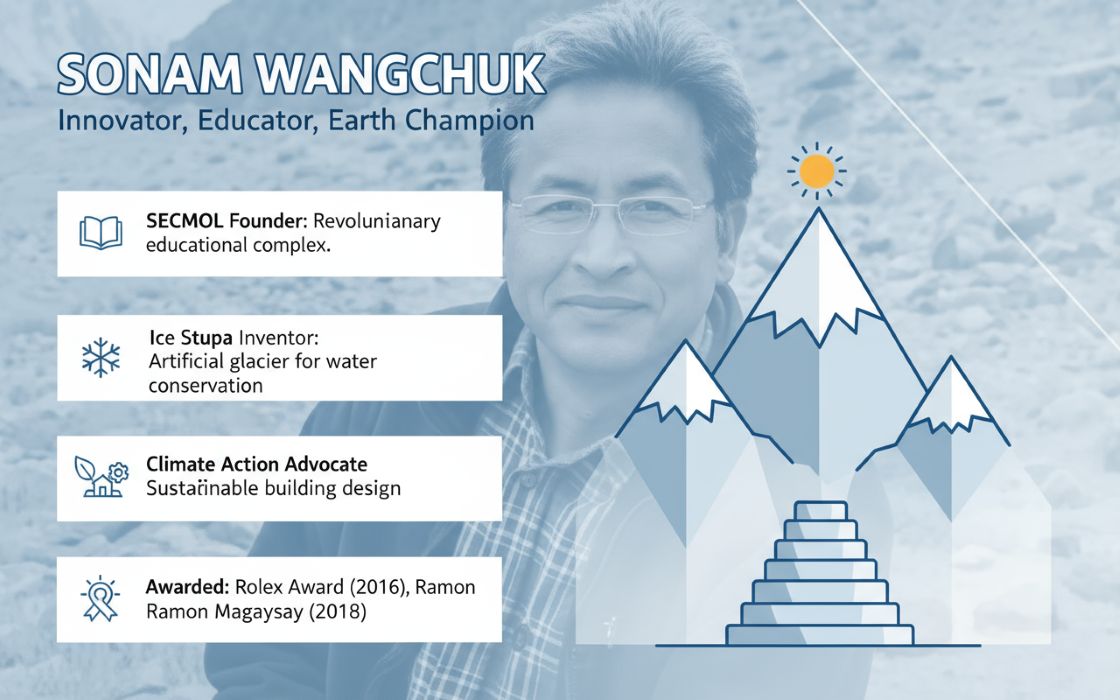As India stands at the crossroads of rapid development and escalating climate risk, the urgency to channel finance toward climate resilience has never been greater. At the Climate Action & Sustainability Conference & Awards (CASCA’25), organized by TheCSRUniverse, presented by M3M Foundation and powered by YBRANT, experts from the worlds of policy, finance, and grassroots engagement converged to chart a roadmap for unlocking green investments that deliver both environmental and socio-economic impact. The panel, titled “Decoding Green Investments: Unlocking Public and Private Funding & Investment for Climate Risk Mitigation for Long-term Impact,” brought together a diverse set of voices—each offering a unique lens on how to bridge the climate finance gap.
The Climate Finance Imperative
Moderator Ms. Neha Agarwal, Founder and Director of Lightroad Ventures, set the stage by highlighting a paradox: while capital for climate action is available, the real challenge lies in structuring, derisking, and ensuring it reaches those who need it most. Drawing from her organization’s work in coral reef restoration, plastic funds, and electric vehicle (EV) financing, Ms. Agarwal underscored the transformative power of blended finance—a model that combines philanthropic and private capital to amplify impact. 
“We’ve seen firsthand that it’s not the lack of money—but how money moves, and who it reaches—that makes the difference,” she noted.
This sentiment resonated throughout the discussion, as panelists explored how to ensure climate finance is not only available but also accessible, effective, and inclusive.
Climate Risk as a Social Justice Issue
Mr. Simran Grover, Founder & CEO of the Centre for Energy, Environment & People (CEEP), brought a people-first perspective to the table. He argued that climate finance must go beyond traditional infrastructure projects and prioritize community resilience—especially for those at the frontlines of climate vulnerability.
“Climate change is part of a poly-crisis. It deepens structural inequities. Resilience is not just about infrastructure, it’s about ensuring better wages, safer working conditions, and rights for the most marginalized,” Mr. Grover said.
He emphasized the importance of empowering local institutions and communities, citing India’s 73rd and 74th Constitutional Amendments as critical levers for democratizing climate decisions and strengthening grassroots capacity.
Blending for Scale and Impact
Dr. Madhu Verma, Senior Economic Adviser at Iora Ecological Solutions and former Chief Economist at the World Resources Institute (WRI), stressed the importance of robust measurement and valuation frameworks. “We can’t manage what we don’t measure,” she asserted, advocating for clear metrics to quantify ecosystem services and climate co-benefits.
Dr. Verma urged a mindset shift: “We always talk about climate finance in isolation, but investing in forests, wetlands, or tiger habitats brings biodiversity, water, soil, and carbon benefits all at once. The multiplier effect is massive.”
She championed mainstreaming mechanisms like Payment for Ecosystem Services (PES) and biodiversity credits, arguing that communities who conserve natural resources should be fairly compensated for their stewardship. 
Deconstructing CSR Constraints and Unlocking Potential
Mr. Tara Chand, Head of CSR at OakNorth and Co-founder of the Indian Association of CSR, Sustainability and ESG Professionals, addressed the operational realities of deploying CSR funds for climate action. “With only ₹25,000 crores in CSR funding, and regulatory constraints preventing returns like carbon credits, we need to innovate smartly,” he said.
Chand highlighted the importance of trust and transparency, suggesting tools like geotagging and blockchain to track impact. He argued that CSR initiatives are uniquely positioned to create proof-of-concept models that governments and multilateral agencies can later scale.
“When climate initiatives are linked with livelihoods, education, or health, they resonate more with CSR boards. For example, we support climate-resilient agriculture that empowers women farmers and enhances income,” Mr. Chand explained.
This integrated approach, he noted, not only broadens the appeal of climate projects but also ensures their sustainability and scalability.
Regulatory Innovation and Financial Instruments
Ms. Mitali Nikore, Founder & Chief Economist at Nikore Associates, brought a policy perspective to the discussion. While acknowledging the potential of blended finance, she identified three systemic challenges:
- Limited regulatory clarity—especially regarding carbon credits, replantation norms, and fund usage.
- Long-term impact horizons of climate projects—often misaligned with short-term CSR mandates.
- Lack of thematic financial instruments, such as climate-specific bonds or adaptation-focused funds.
“There's appetite, but the pathways are missing,” Ms. Nikore observed. She proposed the creation of ready-made financial instruments—like a climate fund akin to PM CARES—to simplify entry for CSR contributors.
Ms. Nikore also spotlighted India’s MSME-focused Fund of Funds as a model that could be adapted for green entrepreneurship. “If we blend institutional investors with philanthropic capital into an Alternative Investment Fund (AIF) targeting green startups or skilling, we can create long-term sustainable impact,” she suggested.
Toward Equitable and Effective Climate Finance
The panel concluded with a consensus on several key takeaways:
- Blended finance is essential to bridge capital gaps and scale innovation.
- Transparency, trust, and impact measurement are non-negotiable to earn investor confidence.
- Climate action must be intersectional—linking with livelihoods, equity, biodiversity, and health.
- Regulatory clarity and financial innovation are needed to de-risk investments and encourage broader participation.
- Communities must be at the center—not just as beneficiaries but as co-creators and decision-makers.
Ms. Neha Agarwal aptly summarized the session: “To move the needle on climate finance, we need collaboration across public, private, and people sectors—with empathy, innovation, and shared accountability.”
Conclusion
As the world navigates an increasingly volatile climate landscape, financial solutions must rise to match the scale and complexity of the challenge. The CASCA’25 panel made it clear: unlocking green investments isn’t just about money—it’s about systems thinking, institutional reform, and people-centric design.
Decoding climate finance is the first step; redesigning it for inclusion, transparency, and impact is the journey ahead. The insights from this panel offer a roadmap for India—and the world—to ensure that climate finance delivers not only for the planet but for its people.









.jpg)







